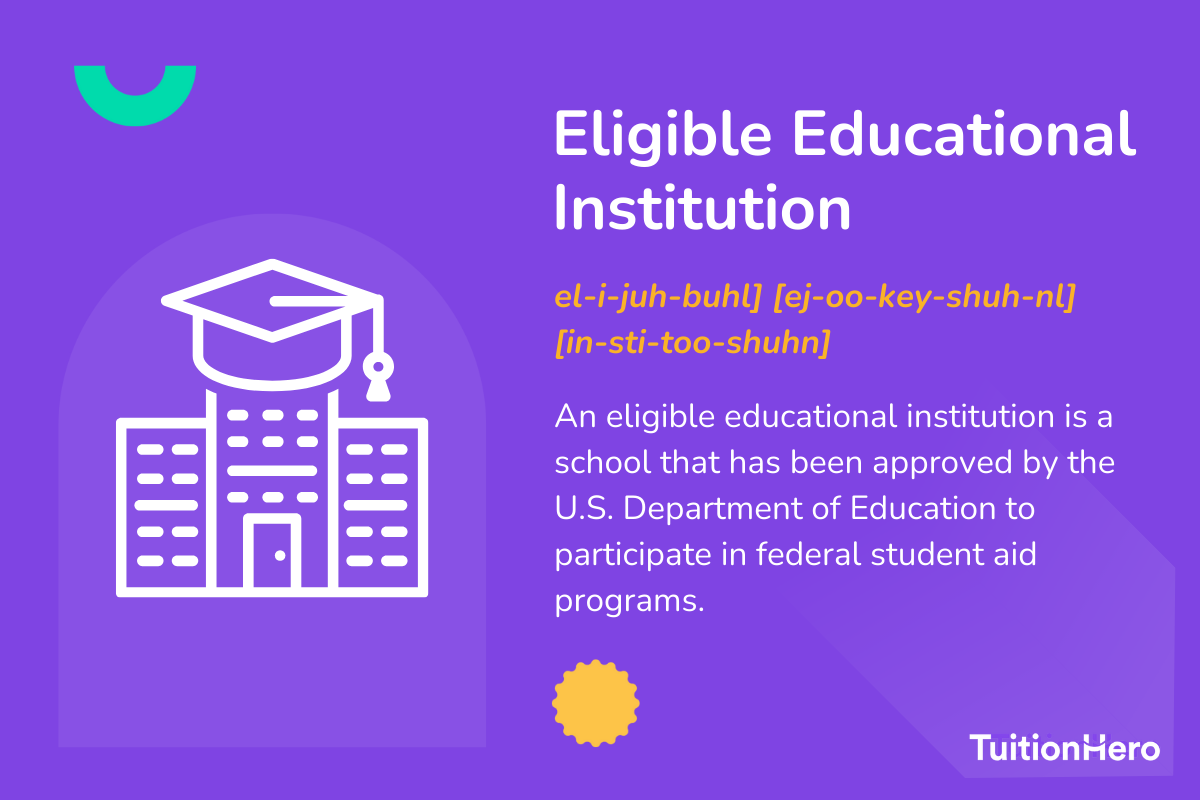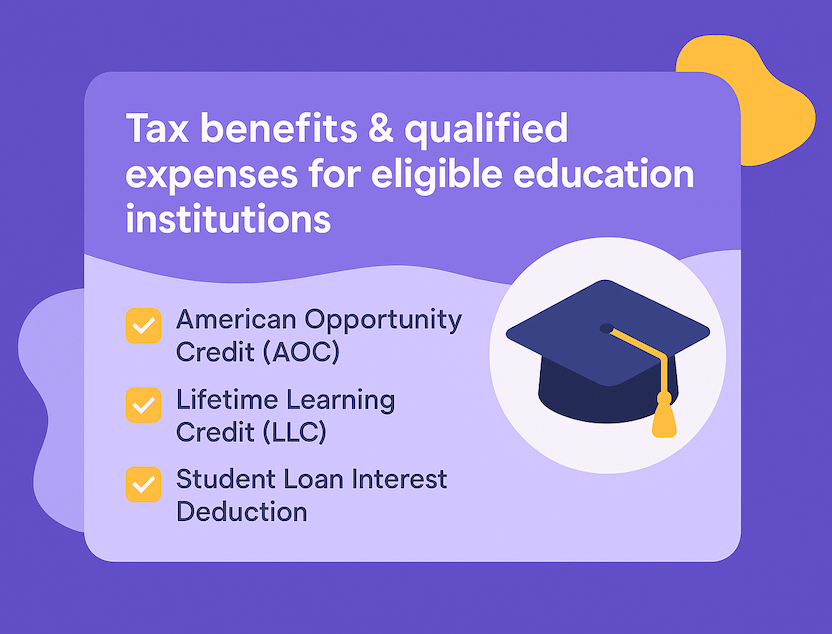Advertiser Disclosure
Last update: June 6, 2025
6 minutes read
Eligible Educational Institution
Discover how to confirm if your school qualifies for federal aid, grants, and student loan tax credits. Learn simple verification steps, eligibility criteria, and key deadlines to save thousands on college.

By Derick Rodriguez, Associate Editor
Edited by Yerain Abreu, M.S.
Learn more about our editorial standards



By Derick Rodriguez, Associate Editor
Edited by Yerain Abreu, M.S.
Learn more about our editorial standards
Choosing the right institution for education goes beyond location and major—you need to know what is an eligible educational institution to access federal aid, tax credits, and loan programs that can save you thousands.
Below, we break down how to spot eligible institutions, verify their status, and maximize the tax benefits available to you.

Key takeaways
- Accreditation is important for eligibility
- Federal student aid depends on institution eligibility
- Choosing a non-eligible institution limits financial aid options
What is an eligible educational institution?
An eligible educational institution is a school that meets specific criteria, making it qualified for federal student aid and other financial benefits.
This covers different types of schools, like regular colleges, job training schools, and some online courses. What makes them special is they're officially approved by the U.S. Department of Education.
They need to be accredited, which makes sure they meet specific educational standards. Plus, they need authorization to teach college courses that lead to a degree or another recognized educational certificate.

Let's dive into the specifics:
- Accreditation: This means an institution is approved because it meets specific quality standards.
- Federal student aid eligibility: Schools that qualify allow their students to apply for federal loans and grants.
- Degree programs: They offer programs that lead to degrees or certificates with recognized educational value.
Knowing if your school is on the list can affect your ability to secure federal student loans and may influence your decision to refinance. Schools not meeting these criteria might limit your access to federal financial aid, making it important to verify your school’s status.

TuitionHero Tip
Remember, there's no one-size-fits-all way to save for college, and what works for one family might be different for another. Visit TuitionHero.org for personalized advice and tools that suit your unique financial situation.
Types of eligible institutions
Not every school that qualifies for federal aid operates the same way. The U.S. Department of Education recognizes three main categories, each fitting the definition of an eligible educational institution or qualified educational institution:
Institutions of Higher Education (IHE):
- Public or private nonprofit colleges and universities
- Offer associate, bachelor’s, graduate or professional degrees (or a one-year certificate that counts toward a degree)
- Must hold accreditation from a U.S. Department of Education–recognized agency
Proprietary institutions of higher education:
- Private, for-profit schools
- Award the same degrees as IHEs plus career-focused credentials
- Subject to the “two-year rule,” meaning they must have run each program for at least two years before getting federal aid approval
Postsecondary vocational institutions:
- Public or private nonprofit career and technical schools
- Provide short-term training programs (300–600 clock hours) that lead directly to a recognized occupation
- Typically eligible only for Direct Loans unless they also meet full higher-ed accreditation standards

TuitionHero Tip
Some large universities also run transition programs for students with intellectual disabilities. Those count as eligible too.
Dos and don'ts of choosing an eligible educational institution
When it comes to choosing an eligible educational institution, making informed decisions is vital to maximizing financial aid opportunities and ensuring a quality education. It's essential to know what can help or hurt your chances. Here's a table that breaks down the dos and don'ts:
Do
Do research on the accreditation of institutions.
Do check for federal student aid eligibility.
Do consider the value of the degree program offered.
Do visit the campus or the institution’s website for more information.
Don't
Don't ignore the institution's accreditation status.
Don't overlook the types of degrees offered.
Don't forget to consider the effect on financial aid options like federal student loans.
Don't rush your decision without thorough research.
How to verify your school’s eligibility
Before you apply for aid, make sure your school really qualifies. Check against these criteria on every eligible educational institution list and be ready to answer:
- Did your school issue you a Form 1098-T? All eligible institutions must send this tuition statement to enrolled students.
- Is your school listed in the ED’s DAPIP database? Use the Department of Education’s searchable list of accredited postsecondary institutions.
- Did you check with your financial aid office? They’re required to confirm federal aid participation status on request.
- Have you tried the IRS Interactive Tax Assistant? A quick Q&A tool shows what is a qualifying educational program and which deductions you can claim.
These simple steps help you avoid surprises when it’s time to fill out FAFSA or claim tax credits.
Compare private student loans now
TuitionHero simplifies your student loan decision, with multiple top loans side-by-side.
Compare Rates
Advantages and disadvantages of choosing an eligible educational institution
Picking the right eligible educational institution is a crucial step in your educational journey. It not only affects your immediate learning environment but also has long-term implications on your finances and career opportunities.
- Accreditation makes sure you get a quality education.
- Eligibility for federal student aid opens doors to grants and loans.
- Degrees from these institutions are recognized and respected by employers.
- Students have access to comprehensive financial aid packages.
- Selection may be limited based on the specific eligibility criteria.
- Some eligible institutions might have higher costs of attendance.
- The application process for financial aid can be complex and time-consuming.
- Stricter academic requirements may pose a challenge for some students.

Tax benefits & qualified expenses
When your eligible education institution meets the criteria, you unlock tax breaks that stretch your dollars further:
- American Opportunity Credit (AOC):
- Up to $2,500 per student per year
- Covers tuition, mandatory fees, and course materials
- Lifetime Learning Credit (LLC):
- Up to $2,000 per return
- Applies to undergrad, graduate, and professional courses
- Student Loan Interest Deduction:
- Deduct up to $2,500 of interest on federal and eligible private loans
- Includes internship or residency programs at a hospital or health facility that lead to a credential
Room and board, transportation, and optional campus fees don’t qualify for these credits—but they do factor into your overall federal aid package.


Why trust TuitionHero
At TuitionHero, we help students and parents with higher education. We offer resources on financing options like private student loans, scholarships, and grants. Our tools simplify the FAFSA process and help find student-friendly credit cards. We're here to support your smart education decisions.
Department of Education notice on eligibility designations
In March 2025, the Department of Education published a Notice Inviting Applications (NIA) in the Federal Register for FY 2025 designations under Titles III and V of the Higher Education Act.
This notice requires institutions to be designated as “eligible” before applying for Strengthening Institutions, Predominantly Black Institutions, or Title V grants, or requesting non-Federal share waivers.
Applications opened on March 6, 2025, and must be submitted electronically by April 7, 2025 via the HEPIS portal. Institutions without automatic designation must complete the “Application for Designation as an Eligible Institution” by that deadline to secure eligibility and waivers.
Frequently asked questions (FAQ)
To learn an institution's accreditation status, visit the official website of the U.S. Department of Education. There, you can find a searchable database of accredited postsecondary institutions and programs. Most institutions also provide this information directly on their websites, usually in the "About Us" section.
Yes, an institution can lose its eligibility for many reasons, like not maintaining the required academic standards or failing to comply with federal regulations. When this happens, students attending the institution may no longer get federal student aid, which highlights the importance of keeping up to date with your institution's accreditation status.
Choosing a non-eligible institution can significantly limit your access to federal student aid, including loans, grants, and work-study programs. You might have to look into other financing options, like private student loans, which have different terms and conditions compared to federal loans. Always consider the financial implications before making a decision.
A common synonym for educational institution is “school,” and you can also use terms like academy, college, university, or learning institution depending on context.
A higher education institution is any postsecondary school—like a college, university, community college, or vocational school—that offers academic or professional credentials beyond the high school level, including associate’s, bachelor’s, master’s, or doctoral degrees, as well as recognized certificates.
Final thoughts
By understanding what is eligible educational institution and following these verification steps, you’ll ensure you choose a school that unlocks every possible financial aid option.
This knowledge helps eligible students keep more money in their pockets and focus on what matters most—achieving academic success and launching a rewarding career.
Source
Author

Derick Rodriguez
Derick Rodriguez is a seasoned editor and digital marketing strategist specializing in demystifying college finance. With over half a decade of experience in the digital realm, Derick has honed a unique skill set that bridges the gap between complex financial concepts and accessible, user-friendly communication. His approach is deeply rooted in leveraging personal experiences and insights to illuminate the nuances of college finance, making it more approachable for students and families.
Editor

Yerain Abreu
Yerain Abreu is a Content Strategist with over 7 years of experience. He earned a Master's degree in digital marketing from Zicklin School of Business. He focuses on college finance, a niche carved out of his journey through the complexities of academic finance. These firsthand experiences provide him with a unique perspective, enabling him to create content that's informative and relatable to students and their families grappling with the intricacies of college financing.
At TuitionHero, we're not just passionate about our work - we take immense pride in it. Our dedicated team of writers diligently follows strict editorial standards, ensuring that every piece of content we publish is accurate, current, and highly valuable. We don't just strive for quality; we aim for excellence.
Related posts
While you're at it, here are some other college finance-related blog posts you might be interested in.
Shop and compare student financing options - 100% free!

Always free, always fast
TuitionHero is 100% free to use. Here, you can instantly view and compare multiple top lenders side-by-side.

Won’t affect credit score
Don’t worry – checking your rates with TuitionHero never impacts your credit score!

Safe and secure
We take your information's security seriously. We apply industry best practices to ensure your data is safe.
Finished scrolling? Start saving & find your private student loan rate today
Compare Personalized Rates




